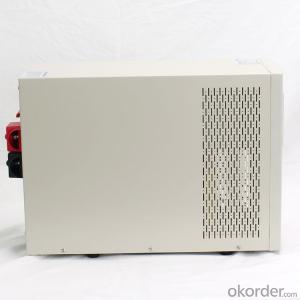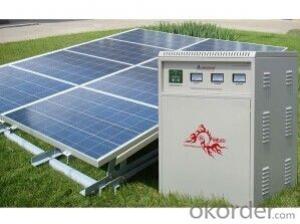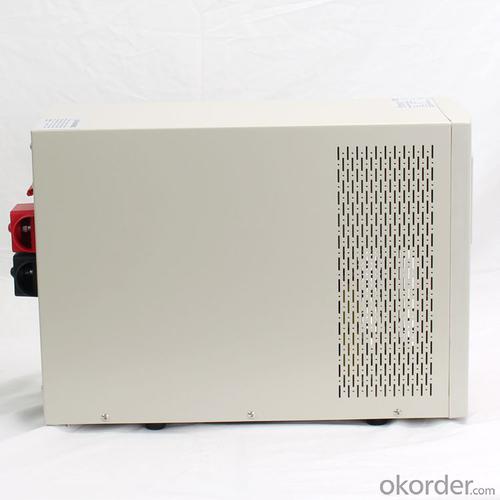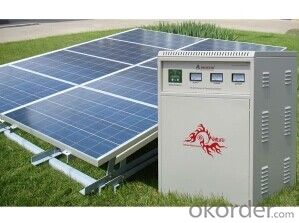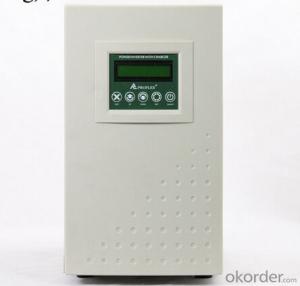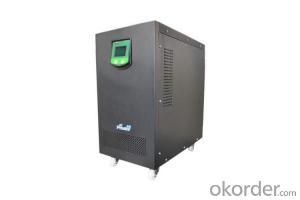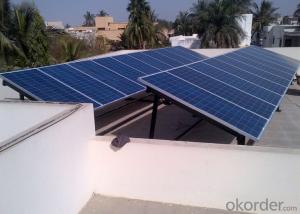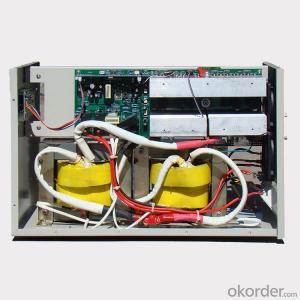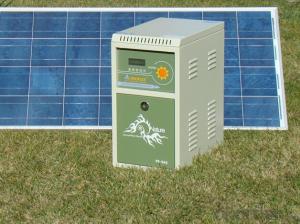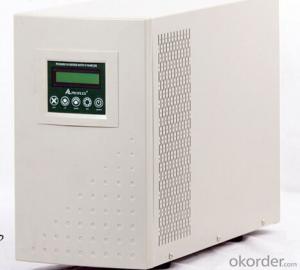Solar Energy Systems Fort Pierce - Off Grid Solar Power System PR-SAS1500 with Battery Tank 1200W
- Loading Port:
- Tianjin
- Payment Terms:
- TT OR LC
- Min Order Qty:
- 10 pc
- Supply Capability:
- 10000 pc/month
OKorder Service Pledge
OKorder Financial Service
You Might Also Like
Specification
Specifications
1.Supply 2 work modes: to save electricity bill or to supply long time power backup.
2. Supply battery tank,high integrated.
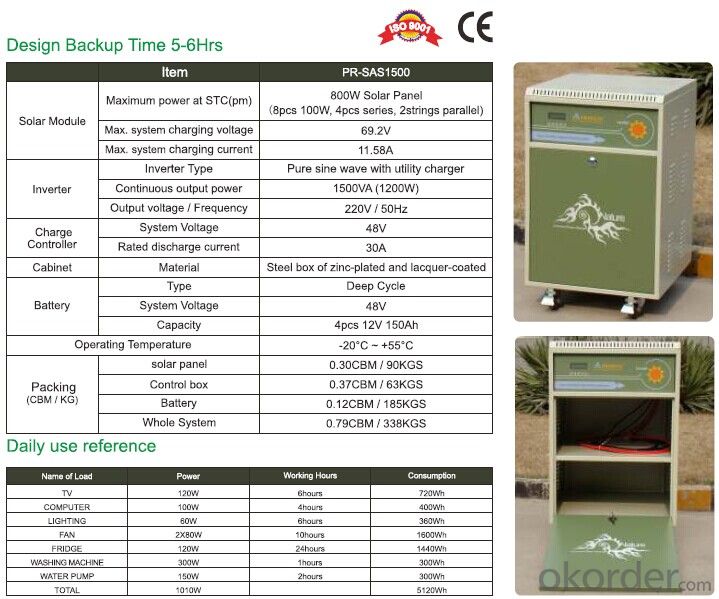

AC solar power system consists of solar batteries, solar controller, battery, inverter components.
Used to solve rural or remote areas without electricity, such as highland, island, pastoral, villas, border posts and other military and civilian life electricity.
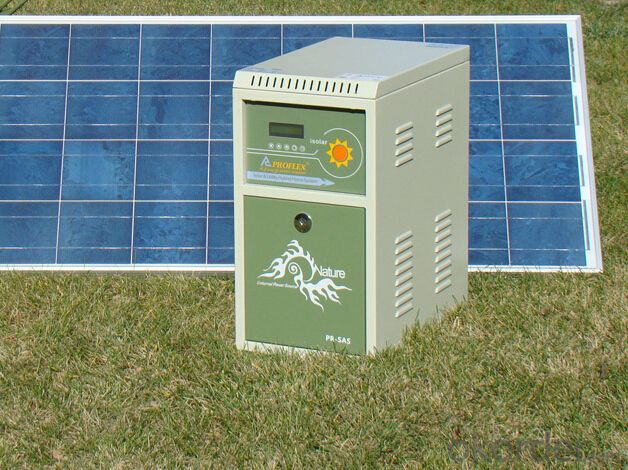
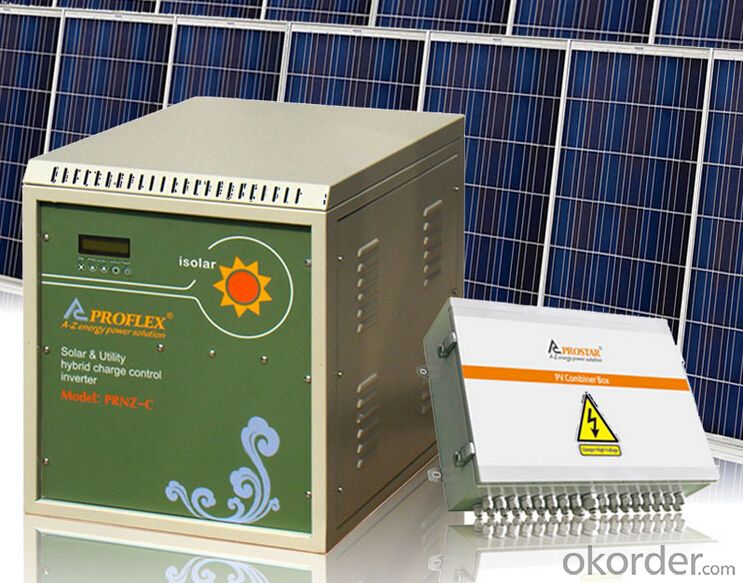
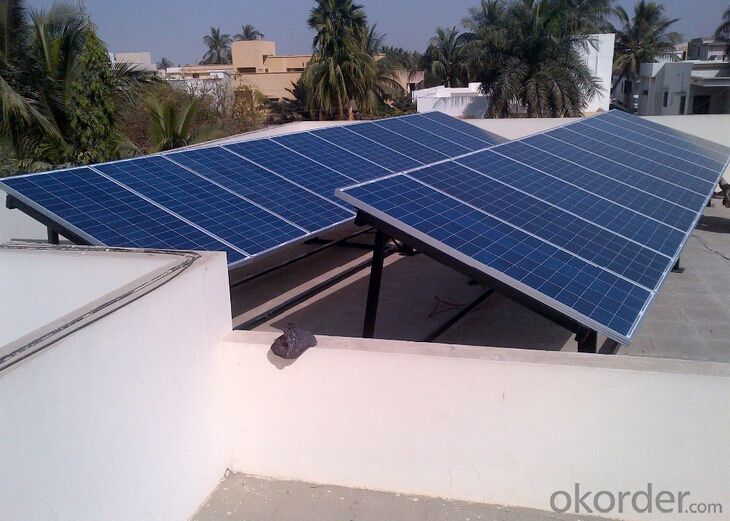
Warranty
CNBM Solar panel provides one of the most comprehensive module warranties in the industry:
· 10 years for product defects in materials and workmanship
· First 12 years for 90% of warranted minimum power
· Remaining 25 years for 80% of warranted minimum power
FAQ
l Where can I buy your products?
You could find our products from dealers or contact our sales team directly. We will provide you with detailed services.
l How to contact us?
Contact details can be found from website www.okorder.com to contact us. We look forward to providing you with professional services.
l What is the application field of your products?
They can be used in the small photovoltaic (PV) grid power generation systems of family units as well as the commercial photovoltaic system such as BIPV, BAPV and etc.
l What kinds of modules do your inventers support?
Our inventers support most of mainstream components and modules in the market. Should you require more details, please do not hesitate to contact our technical personnel.
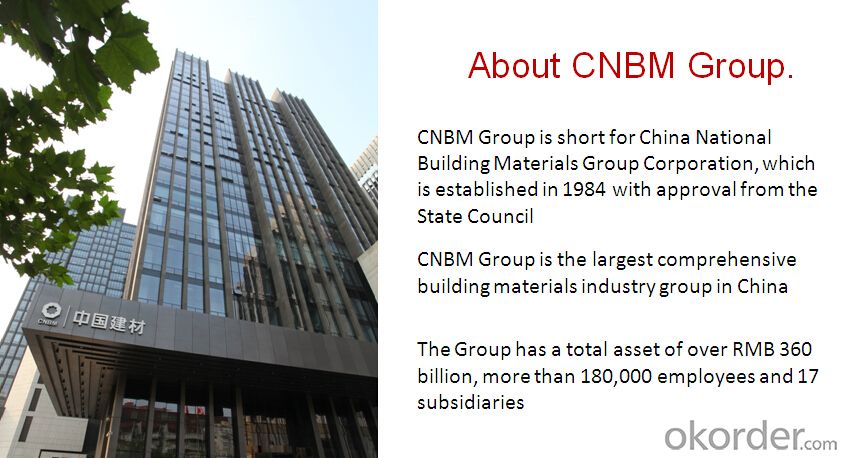

- Q: How does the installation of solar panels affect the building's resale value?
- The installation of solar panels can have a positive impact on a building's resale value. Solar panels are seen as a valuable addition to a property as they provide several benefits. Firstly, solar panels can significantly reduce or even eliminate electricity bills, which is an attractive feature for potential buyers. The prospect of saving money on energy costs can make a property more appealing and increase its market value. Additionally, with rising concerns about climate change and a growing interest in sustainable living, having solar panels can be seen as a desirable feature that aligns with eco-conscious values. Moreover, solar panels can also generate income through net metering programs. In some regions, excess electricity generated by solar panels can be sold back to the grid, providing an additional revenue stream. This financial benefit can make a property more valuable and attract buyers who are interested in renewable energy investments. Furthermore, the installation of solar panels can contribute to a building's overall energy efficiency. This can lead to improved energy performance ratings and certifications, such as LEED or Energy Star, which can further enhance the property's resale value. However, it is important to note that the impact on resale value may vary depending on various factors, including the location of the property, local housing market trends, and the size and quality of the solar panel system. It is advisable to consult with real estate professionals or appraisers who have experience in evaluating the impact of solar panels on property values in a specific area.
- Q: Can solar energy systems be used in powering disaster relief centers or emergency shelters?
- Yes, solar energy systems can definitely be used in powering disaster relief centers or emergency shelters. In fact, solar power is increasingly being utilized in such situations due to its numerous benefits. One of the key advantages of solar energy systems is their ability to function independently of the grid. During natural disasters or emergencies, the conventional power grid may be disrupted or completely unavailable. In such situations, solar panels can generate electricity from sunlight, providing a reliable and sustainable source of power for essential operations in relief centers or shelters. Solar energy systems are also highly portable and modular, making them ideal for temporary installations. They can be quickly deployed and set up in disaster-stricken areas, providing immediate power for lighting, communication devices, medical equipment, and other critical needs. Additionally, solar energy systems can be easily expanded or modified to meet the increasing energy demands of relief centers or shelters as the situation evolves. Furthermore, solar power systems have minimal environmental impact compared to traditional fuel-based generators. They produce clean energy without releasing harmful pollutants or greenhouse gases, which is particularly important in disaster-stricken areas where air quality may already be compromised. Lastly, solar energy systems offer long-term cost savings. Once installed, solar panels require minimal maintenance and have a lifespan of 25-30 years. This reduces the reliance on expensive and often scarce fuel supplies, allowing relief centers and emergency shelters to allocate their resources more efficiently. In conclusion, solar energy systems are a reliable, sustainable, and cost-effective solution for powering disaster relief centers or emergency shelters. Their ability to function independently, portability, minimal environmental impact, and long-term cost savings make them an excellent choice for powering critical operations during times of crisis.
- Q: Are there any fire risks associated with solar energy systems?
- Yes, there are fire risks associated with solar energy systems, although they are relatively low compared to other energy sources. The most common fire risks include electrical malfunctions, such as faulty wiring or connectors, and overheating of components. However, modern solar systems are designed with safety measures, such as built-in fire barriers and automatic shut-off mechanisms, to minimize these risks. Regular maintenance and inspections by qualified professionals can further reduce the chances of fire incidents.
- Q: Can solar energy systems be installed on mobile homes?
- Yes, solar energy systems can be installed on mobile homes.
- Q: Are there any safety concerns associated with solar energy systems?
- Yes, there are some safety concerns associated with solar energy systems. While solar panels are generally safe, there is a risk of electric shock if proper precautions are not taken during installation or maintenance. Additionally, the chemicals used in the manufacturing of solar panels, such as lead and cadmium, can be hazardous if not handled and disposed of properly. Fire hazards are another concern, as solar panels can generate heat and potentially cause fires if damaged or installed incorrectly. However, with proper installation, regular maintenance, and adherence to safety guidelines, these risks can be minimized, making solar energy systems a safe and viable option for renewable energy.
- Q: Can solar energy systems be used for powering electric vehicle car-sharing programs?
- Yes, solar energy systems can be used to power electric vehicle car-sharing programs. By harnessing the sun's energy, solar panels can generate electricity to charge the batteries of electric vehicles and support their operations in car-sharing programs. This renewable energy source aligns well with the sustainability goals of electric vehicles and can contribute to reducing the carbon footprint of transportation.
- Q: Can solar panels be installed on different surfaces like glass or metal?
- Yes, solar panels can be installed on different surfaces like glass or metal. In fact, solar panels are commonly installed on glass surfaces, such as windows or skylights, to maximize sunlight exposure. Additionally, solar panels can also be mounted on metal roofs or other metal structures. The key requirement is ensuring a sturdy and secure installation to support the weight of the panels and maximize their efficiency.
- Q: Can solar energy systems be used for space exploration?
- Yes, solar energy systems can be used for space exploration. In fact, solar panels are commonly used in spacecraft to provide power for various systems and instruments. Solar energy is reliable, abundant, and can be harnessed even in space where sunlight is not filtered by the Earth's atmosphere.
- Q: Can a solar energy system be installed on a school or university campus?
- Certainly, it is possible to install a solar energy system on the premises of a school or university. As a matter of fact, numerous educational institutions have already adopted solar power as a viable and economical solution for their energy requirements. By placing solar panels on roofs, parking areas, or open spaces within the campus, it becomes feasible to harness clean electricity from the ample sunlight accessible. This renewable energy source not only aids in reducing carbon emissions and cutting down on electricity expenses but also creates educational opportunities for students to gain knowledge about sustainable energy technologies. Furthermore, with the progress in solar technology and the availability of various incentives, schools and universities find it more affordable and practical to invest in solar energy systems.
- Q: How does the temperature affect the performance of solar panels?
- The temperature can significantly affect the performance of solar panels. In general, solar panels operate at their highest efficiency when the temperature is around 25 degrees Celsius (77 degrees Fahrenheit). However, as the temperature rises above this ideal range, the performance of the panels can decline. The primary reason for the decrease in performance is that solar panels are made up of photovoltaic (PV) cells that convert sunlight into electricity. These cells consist of semiconductors, typically made of silicon, which generate electricity when exposed to sunlight. When the temperature increases, the electrons in the PV cells gain more energy and move more rapidly, which can lead to increased resistance within the cells. This increase in resistance reduces the flow of electric current, resulting in a decrease in the overall power output of the solar panel. Moreover, the temperature increase can also cause a phenomenon called the "thermal effect." This effect results in a slight increase in the voltage output of the solar panels, but it is not proportional to the increase in temperature. As a result, the overall efficiency of the solar panels decreases. Additionally, higher temperatures can also lead to a decrease in the lifespan of the solar panels. The excessive heat can cause thermal stress on the materials used in the construction of the panels, leading to potential degradation and reduced durability over time. It is important to note that while high temperatures can negatively impact the performance of solar panels, they can still produce electricity even in hot climates. However, to mitigate the effects of temperature, solar panels are often designed with heat dissipation mechanisms, such as air gaps, ventilation, or cooling systems, to prevent excessive heat buildup and maintain optimal performance. Ultimately, the impact of temperature on solar panel performance varies depending on the specific design and materials used. It is crucial to consider temperature as a factor when installing solar panels and take necessary measures to maximize their efficiency and longevity.
Send your message to us
Solar Energy Systems Fort Pierce - Off Grid Solar Power System PR-SAS1500 with Battery Tank 1200W
- Loading Port:
- Tianjin
- Payment Terms:
- TT OR LC
- Min Order Qty:
- 10 pc
- Supply Capability:
- 10000 pc/month
OKorder Service Pledge
OKorder Financial Service
Similar products
Hot products
Hot Searches
Related keywords
